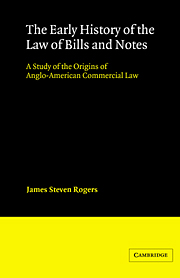 The Early History of the Law of Bills and Notes
The Early History of the Law of Bills and Notes Book contents
- Frontmatter
- Contents
- Preface
- Table of cases and precedents
- Note on citation
- Introduction
- 1 The central courts, commercial law, and the law merchant
- 2 Early exchange transactions: commercial practice
- 3 Early exchange transactions: private law
- 4 Early exchange transactions: public law and policy
- 5 From exchange transactions to bills of exchange: the transformation of commercial practice
- 6 The custom of merchants and the development of the law of bills
- 7 The civilians and the law of bills in the seventeenth century
- 8 Transferability and negotiability
- 9 The law of bills and notes in the eighteenth century
- 10 The problem of accommodation bills
- Conclusion
- Bibliography
- Index
5 - From exchange transactions to bills of exchange: the transformation of commercial practice
Published online by Cambridge University Press: 22 September 2009
- Frontmatter
- Contents
- Preface
- Table of cases and precedents
- Note on citation
- Introduction
- 1 The central courts, commercial law, and the law merchant
- 2 Early exchange transactions: commercial practice
- 3 Early exchange transactions: private law
- 4 Early exchange transactions: public law and policy
- 5 From exchange transactions to bills of exchange: the transformation of commercial practice
- 6 The custom of merchants and the development of the law of bills
- 7 The civilians and the law of bills in the seventeenth century
- 8 Transferability and negotiability
- 9 The law of bills and notes in the eighteenth century
- 10 The problem of accommodation bills
- Conclusion
- Bibliography
- Index
Summary
Though there is always a risk of oversimplification in dividing history into chronological periods, the middle of the seventeenth century serves as a convenient dividing line in the history of commercial practice concerning bills of exchange. The periods before and after the mid-seventeenth century might be called the era of exchange transactions and the era of bills of exchange, respectively. In the earlier era, exchange was a contract between the deliverer and the taker, which happened to have been carried out by means of a bill of exchange. In the later era a bill of exchange was an instrument that created and embodied an obligation binding the drawer (and, after acceptance, the drawee) to pay money to the payee or other holder; whether it happened to have been issued in a transaction akin to the exchange transactions of earlier times was of little significance.
THE ERA OF EXCHANGE TRANSACTIONS AND THE ERA OF BILLS OF EXCHANGE
The differences in commercial practice in the periods before and after the mid-seventeenth century can be seen quite clearly by contrasting portrayals of typical transactions in the two periods. In a seventeenth-century book on commerce, Lewes Roberts described a typical exchange transaction as follows:
Exchange … is … the giving of so much Moneys in one place to one, who should cause it to be again repaid in another place by another for him; as for example, Edward hath here in London one thousand pounds, and desireth to remit the same, or have it in the hands of Joseph who resideth in Venice; and Lodowick hath one thousand pounds in Venice, in the custody and hands of Thomas, which he would get, receive, and recover out and have them here: it happeneth that Edward meeteth with Lodowick, to whom he delivereth and payeth the said one thousand pounds; and thereupon Lodowick writeth to Thomas, that he pay the said thousand pounds to Joseph, and thus each party comes to be both satisfied and accommodated; by which it may be discerned, that in all Exchanges, there is concluded two payments, two places, and four distinct persons; as he who payeth in the one place, and he who receiveth in the other; and he who receiveth in the one place, and he who payeth in the other; and from hence it consequently followeth, that no man can remit, except there be another to draw, nor no man can in the second place receive, except there be another authorized to pay
- Type
- Chapter
- Information
- The Early History of the Law of Bills and NotesA Study of the Origins of Anglo-American Commercial Law, pp. 94 - 124Publisher: Cambridge University PressPrint publication year: 1995


